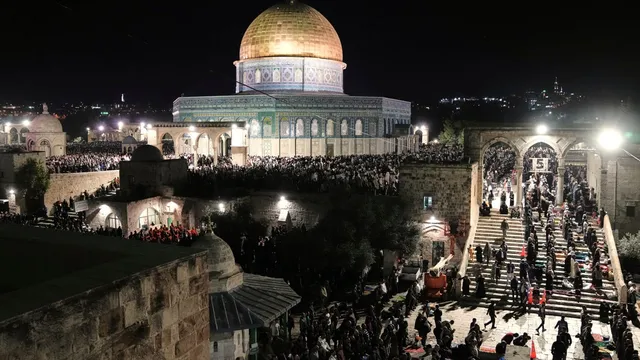
Israel threatens severe retaliation against Lebanon amid ongoing rocket attacks
2025-03-28 12:52- Israeli military conducted airstrikes in response to rockets fired from Lebanon.
- Rocket attacks have prompted warnings from Israel's Defense Minister regarding retaliation.
- Ongoing tensions suggest a concerning backdrop for future security in the region.
Express your sentiment!
Insights
In recent developments in Israel, the military responded to rocket attacks from Lebanon with air strikes targeting Hezbollah. On Thursday, March 27, 2025, air raid sirens were activated in Kiryat Shmona and nearby communities after terrorists in Lebanon launched two rockets into northern Israel. One was intercepted, while the other fell short, inside Lebanon. In response to the escalation, the Israeli military conducted air strikes on Hezbollah command centers, which were acknowledged to be linked with the attacks. This has raised significant security concerns, as defense officials believe the new wave of rocket fire signifies ongoing threats rather than a one-time incident. The situation is complicated by regional tensions and the ongoing conflicts, notably the war with Hamas, which further aggravates the security climate. Israel's Defense Minister Israel Katz underscored the seriousness of the attacks by stating that if peaceful conditions were not restored to Israel's northern cities, the ramifications would be severe for Beirut. He emphasized Lebanon’s responsibility for the acts originating from within its territory and reaffirmed Israel's commitment to ensure the security of its citizens, suggesting potential further military operations if provocations continued. The context of these events is particularly significant, following the ceasefire between Israel and Hezbollah, which had been in place since November 2023. Observations by local authorities have indicated that despite the constant threat, daily life continues in parts of northern Israel, though with heightened caution and concern. This precarious balance will likely be tested further as more escalations could lead to broader regional instability, drawing in international responses amid an already volatile atmosphere in the area.
Contexts
The Israel-Lebanon border has been a volatile region characterized by a series of conflicts and ongoing tensions primarily between Israel and Hezbollah, the Lebanese militant group. The complexities of this conflict involve historical grievances, territorial disputes, and the broader regional power struggles influenced by sectarian alignments and foreign interventions. Israel's involvement is largely driven by its need to secure its northern borders and counter Hezbollah's military capabilities, which have expanded significantly since the 2006 Lebanon War. The region has seen intermittent skirmishes, with both sides exchanging fire over disputed areas, particularly in the Shebaa Farms and the Golan Heights, territories claimed by Lebanon but occupied by Israel since the 1967 Six-Day War. Control over these areas remains a significant point of contention contributing to the ongoing hostilities. Furthermore, the dynamics of the conflict are further complicated by the roles of external actors, such as Iran's support for Hezbollah and the implications of Syrian involvement in Lebanon's political landscape, especially following the Syrian Civil War. Recent developments have shown a pattern of increased military activity along the border. Reports indicate that both sides have engaged in military drills and test launches, signaling a potential escalation of the conflict. The Israeli Defense Forces (IDF) have been proactive in targeting Hezbollah positions through airstrikes, aiming to deter their advancements and prevent missile attacks. Simultaneously, Hezbollah has nourished its rhetoric against Israel, vowing to respond to Israeli incursions and asserting its capabilities to hit Israeli targets deep within its territory. This tit-for-tat military posture continues to elevate tensions, leaving both nations on edge and raising concerns about a potential full-scale war. International responses to the Israel-Lebanon border situation have been mixed. While Western nations typically express support for Israel's right to defend itself, there is a growing concern regarding the humanitarian implications of continuing hostilities, particularly for Lebanese civilians who may bear the brunt of military escalations. The United Nations has been actively engaged in the region, monitoring ceasefire agreements and attempting to facilitate dialogue between the opposing parties. However, diplomatic efforts have often been undermined by a lack of trust and an unwillingness to make concessions. The enduring instability along the Israel-Lebanon border not only poses a threat to regional security but also raises questions regarding the effectiveness of international peacekeeping measures in a deeply fractured context. As of March 2025, the future of the Israel-Lebanon border conflict remains uncertain. Heightened military activities, ongoing political maneuvering, and fluctuating alliances further complicate the prospect of peace. Both Israel and Hezbollah are investing in their military capabilities, leading to a precarious situation where a single miscalculation could trigger a wider conflict. Continued observation of the border dynamics is essential, as developments here are likely to impact broader geopolitical relations in the Middle East, particularly in light of the ongoing conflicts in Syria and tensions with Iran. In summary, the Israel-Lebanon border remains a critical flashpoint that demands careful attention and proactive diplomatic efforts to avert further violence and promote long-term stability.